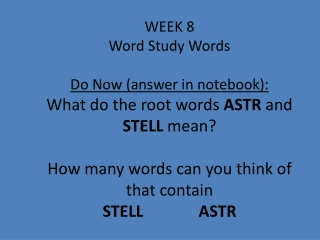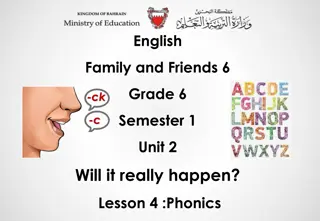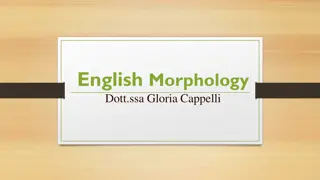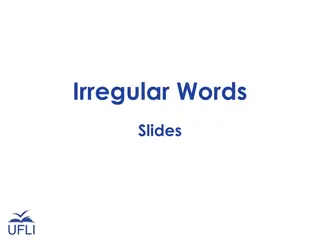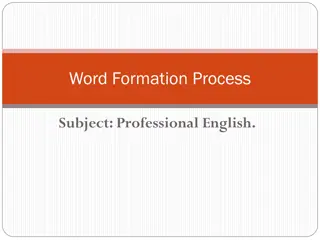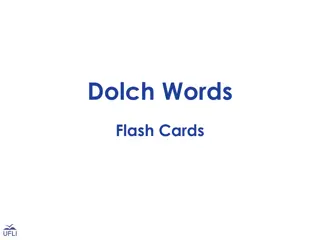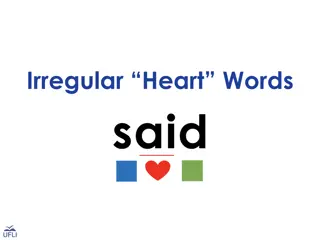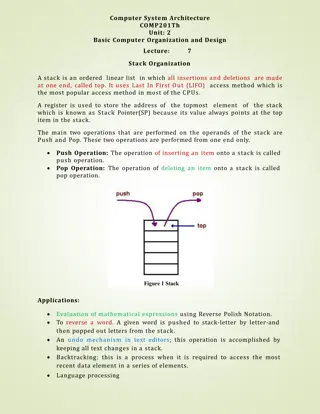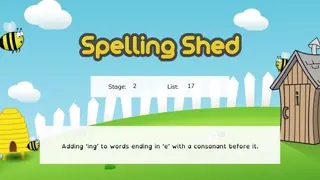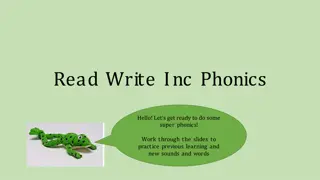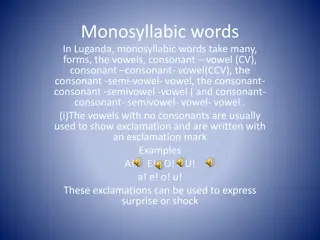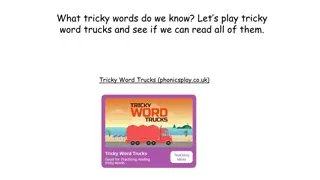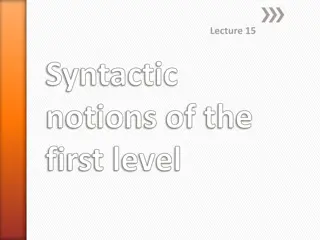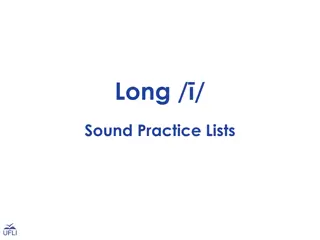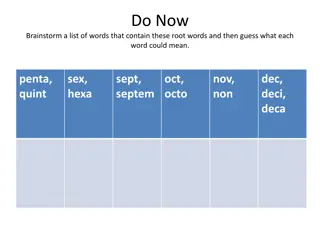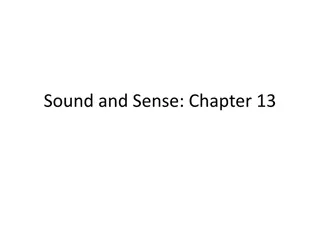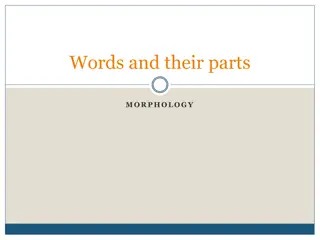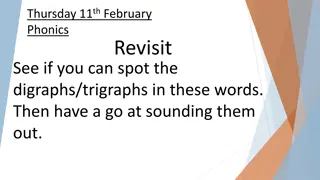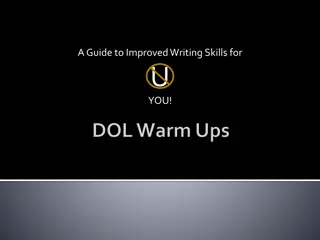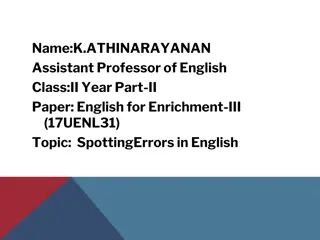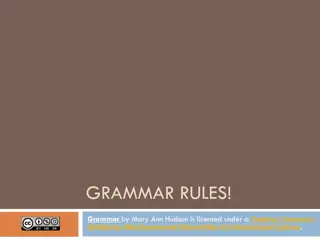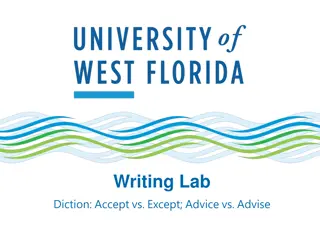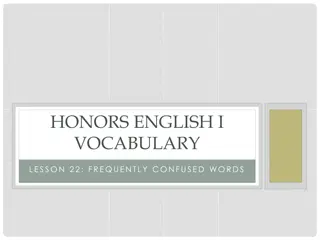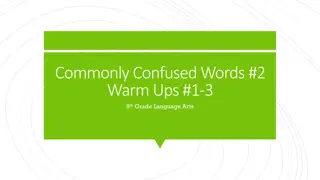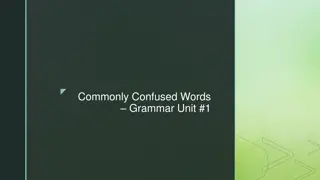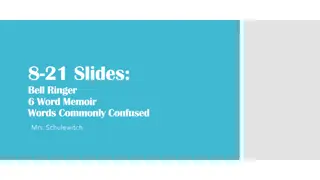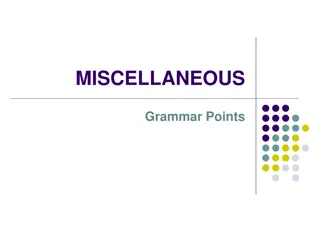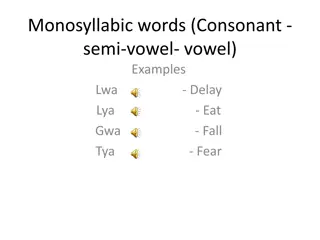Explore Root Words ASTR and STELL
Uncover the meanings of the root words ASTR and STELL through words like astronomy, asteroid, stellar, and more. Delve into the world of stars and star-like objects through words that are rooted in ASTR and STELL.
34 views • 14 slides
Phonics Lesson for Grade 6: Words ending with "-ck" and "-c
This lesson focuses on identifying and spelling words ending with "-ck" and "-c," as well as using them accurately in sentences. Students will practice words like duck, picnic, music, neck, plastic, comic, rock, and clock. Activities include completing words with "c" or "ck," practicing spelling, an
1 views • 9 slides
Understanding English Morphology: The Study of Words and Meaning
English Morphology delves into the structure of words, exploring morphemes as the building blocks of linguistic meaning. From free morphemes like "certain" to bound morphemes like "-ly," the discipline uncovers how words are constructed and adapted grammatically. By examining the derivational and in
0 views • 49 slides
Irregular Words: Learn and Review Commonly Used Words
This text provides a list of irregular words commonly used in English. It includes words like "the," "has," "were," and "know." Practice and remember these words to improve your vocabulary and language skills.
0 views • 169 slides
Various Word Formation Processes in Professional English
Coinage, Borrowing, Compounding, Derivation, Blending, Backformation, and Acronym are key mechanisms for forming new words in Professional English. Coinage involves inventing new words, Borrowing uses words from foreign languages, Compounding combines words to create new ones, Derivation adds prefix
0 views • 11 slides
Dolch Words Flash Cards: Pre-Primer Level Vocabulary
Explore a collection of Dolch words flashcards, including common words like "the," "to," "and," "a," and more. These vibrant images provide an engaging way to learn and practice essential pre-primer level vocabulary words. Enhance your reading and language skills with this visual learning resource.
0 views • 226 slides
Understanding Irregular Heart Words in Teaching
Exploring the concept of irregular heart words in teaching where common words present challenges due to irregularities in letter-sound correspondences. Learn how to help students decode and master these irregular words effectively through targeted activities and teaching tips.
0 views • 181 slides
Stack Organization in Computer Systems
A stack is an ordered linear list where insertions and deletions occur at one end, known as the top. It follows the Last In First Out (LIFO) access method and is commonly used in CPUs. Key operations include Push (inserting) and Pop (deleting) items from the stack. Applications include evaluating ma
0 views • 5 slides
Study Skills for Natural Disasters Unit 8: Compound Words and Word Division
Enhance your study skills with the Unit 8 curriculum focused on compound words, word division, and vocabulary building. Engage in pre-tasks related to family dynamics, household chores, and countryside settings. Practice dividing words and forming new words while expanding your vocabulary in an inte
0 views • 24 slides
Adding -ing to Words Ending in -e with a Consonant: Spelling Rule Activity
Explore the spelling rule of adding -ing to words that end in -e with a consonant before it through engaging activities like spellings, word cards, and detective work. Reinforce the concept by practicing with words like hike, shine, joke, and more. Encourage children to discover how to transform roo
0 views • 8 slides
Super Phonics Practice with Read Write Inc Phonics
Join in for an engaging session to work on previous and new sounds and words through interactive slides, including Speed Sounds, Red Words, reviewing word patterns, practicing new sounds like "ew" and "oo," and identifying grotty graphemes in red words. Enhance your phonics skills and spot new words
0 views • 12 slides
Understanding Monosyllabic Words in Luganda
Monosyllabic words in Luganda come in various forms, including vowels as exclamations or questions, consonant-vowel words with complete meanings, nasal-consonant-vowel words, double consonant-vowel words, and more. These words play different roles in expressing surprise, asking questions, or conveyi
0 views • 8 slides
Discover Tricky Words Through a Fun Phonics Game
Explore the world of tricky words with an engaging phonics game named Tricky Word Trucks from phonicsplay.co.uk. Test your reading skills by identifying and reading various tricky words presented in the game. Get ready to challenge yourself and have fun with words!
0 views • 4 slides
Learning Phonics Skills: Recap, ng Sound Recognition, Blending Words
Enhance phonics skills through a recap session and ng sound recognition exercises. Practice blending words with recognized sounds and tackle tricky words. Gain confidence in creating sentences using red words. Engaging visuals and activities make learning enjoyable and effective.
0 views • 13 slides
Syntactic Notions of the First Level in Linguistics
In this lecture, the syntactic notions of the first level in linguistics are discussed, focusing on word groups, simple sentences, and the essential features of actual division. The different types of syntagmatic groupings of words, such as notional words, functional words, and their combinations, a
1 views • 19 slides
Fun with Sam's Sounds and Exception Words for Reading Practice!
Explore Sam's sounds and common exception words with engaging activities like revealing hidden words, reading practice, and exciting adventures. Join Kit and Sam as they help Jay the alien in a magical journey using ay words and their special magic book.
0 views • 20 slides
Understanding Compound Words and Phrases in Morphology & Syntax
Exploring the differences between compound words and phrasal words in linguistics, this content delves into how roots combine to form compounds and how phrasal words function syntactically. Through examples like "green house" versus "greenhouse," as well as stress and semantic criteria, the distinct
1 views • 51 slides
Exploring Long i, e, and y Sounds with Practice Lists and Words
Uncover the world of long vowel sounds with engaging practice lists and words featuring the sounds of i, e, and y. Dive into words like bike, mine, light, and sky to enhance your pronunciation and spelling skills. Explore images associated with these words to aid in visual learning and retention.
0 views • 13 slides
Learn Root Words and Their Meanings Through Examples
Explore words containing root words like "penta," "quint," "sex," "hexa," "sept," "oct," "nov," "non," "dec," "deci," "deca" with explanations and example sentences. Dive into the definitions of words like "decimate," "octogenarian," "quintessence," "septennial," "novice," and "decadence" to enhance
0 views • 14 slides
Exploring Sound Associations in Language
Delve into the fascinating world of onomatopoeic words, phonetic intensives, and associations between sound and meaning in language. Discover how words like "hiss," "snap," and "bang" mimic their sounds, and how sounds like "fl-" relate to moving light. Explore the connections between sounds and the
0 views • 15 slides
Fun Spelling Words with Two-Letter Patterns Ending in -que
Explore this week's spelling words featuring two-letter patterns typically found at the end of words, focusing on -que that makes a /k/ sound. Dive into words like mosque, cheque, unique, and antique through Mr. Whoops' interactive word juggling activity.
0 views • 14 slides
Understanding Words and Their Parts in Morphology
Explore the world of words and their parts in morphology through exercises, classifications of word classes, differentiation between content words and function words, analysis of words beginning with "b," homonyms, polysemy, and verb inflection. Delve into the various aspects of linguistics to enhan
0 views • 49 slides
Commonly Confused Words and Their Correct Usage Explained
Effect vs. Affect: An effect is a result or consequence, while affect means to have an impression or influence on something. Fewer vs. Less: Fewer for countable items, less for uncountable. Many vs. Much: Many for a definite number, much for a large quantity. Imply vs. Infer: Imply suggests without
0 views • 15 slides
Practising Sounds and Words with Sam - Reading Focus on 'ph' Sound
Practice reading common exception words and sounds with Sam. Explore words with the 'ph' sound. Join in the fun with Sam and Kit as they visit dolphins and engage in an exciting adventure. Enhance reading skills and enjoy learning new words in an engaging way.
0 views • 25 slides
The Linguistic Impact of French Influence on the English Language
The Normans contributed over 10,000 words to the English language, shaping vocabulary related to government, authority, fashion, art, and more. The integration of French and Old English words led to the evolution of language during this period, with some words persisting while others were replaced o
0 views • 12 slides
Phonics Revisit: Digraphs and Tricky Words Practice
Explore digraphs and trigraphs in words like "growl," "frown," "spear," and practice sounding out tricky words such as "come," "they," and "when." Learn about the sounds "ei" and "eigh" making the "ay sound" and practice spelling words like "eight," "eighty," and "neighbour." Test your memory with a
0 views • 9 slides
Mastering Writing Skills: Corrections and Word Usage Practice
Enhance your writing prowess with a hands-on practice session focusing on sentence correction and proper usage of commonly confused words like affect/effect and accept/except. Engage in a guided exercise to refine your writing skills and strengthen your language proficiency.
0 views • 27 slides
Learning Vocabulary with Visual Examples
Explore vocabulary words such as "ordinary," "control," "cage," "upset," "sensible," "confused," "training," and "suspiciously" through engaging visual examples. Enhance your understanding of each word's meaning, synonyms, antonyms, and usage in sentences.
0 views • 9 slides
Understanding Adjectives and Adverbs Usage: Common Errors and Differences
Adjectives modify nouns and pronouns, while adverbs modify verbs, adjectives, and other adverbs. Learn the differences, common errors, and how to distinguish between commonly confused adjective/adverb pairs like real/really and sure/surely. Enhance your understanding of when to use each correctly.
0 views • 7 slides
Commonly Confused Words in English Usage
Understanding and differentiating between commonly confused words in English can improve writing accuracy and clarity. Examples include distinctions between "they're, their, there," "you're, your," "who's, whose," "it's, its," "to, too, two," and more. Proper usage of these words enhances communicat
0 views • 35 slides
Grammar Rules by Mary Ann Hudson - A Guide to Proper Capitalization and Punctuation
Explore essential grammar rules for proper capitalization, including guidelines for proper and common nouns, titles before people's names, quotations, interrupted quotations, titles and subtitles, as well as commonly confused words. Enhance your writing skills by understanding when to capitalize, pu
0 views • 79 slides
Diction in Grammar: Accept vs. Except, Advice vs. Advise
Understand the distinctions between commonly confused word pairs in English grammar: "accept" vs. "except" and "advice" vs. "advise." Practice examples provided to enhance comprehension and usage accuracy.
0 views • 6 slides
Effective Strategies for Word Study in Text Analysis
Explore common fallacies in word study such as the English-Only Fallacy, Root Fallacy, Time-Frame Fallacy, and Over-load Fallacy. Learn how to overcome these fallacies by giving context priority and using concordances. Discover practical steps to choose words for study, including looking for critica
0 views • 7 slides
Frequently Confused English Vocabulary: Lesson 22
Explore the distinctions between commonly confused words in English vocabulary, such as adverse and averse, emigrate and immigrate, ingenious and ingenuous. Enhance your understanding of these words with clear definitions and illustrative examples. Strengthen your language skills and avoid mix-ups w
0 views • 11 slides
Commonly Confused Words & Their Usage in Sentences
Explore the distinctions between commonly confused words like elicit vs. illicit, allude vs. elude, accept vs. except, proceed vs. precede, and discrete vs. discreet through engaging examples and explanations. Enhance your language skills and avoid confusion in writing with this educational content
0 views • 7 slides
Overview of NLP Word Distributions and Stop Words
Introduction to NLP discusses how words are not evenly distributed using examples like the 80/20 rule. The distribution of words in Shakespeare's "Romeo and Juliet" is highlighted, showing common word frequencies. Additionally, Stop Words Fact explains how common English words dominate text composit
0 views • 14 slides
Commonly Confused Words in Grammar: Unit #1
Clear up confusion with commonly confused words in grammar: there, their, they're; your, you're; then, than; two, too, to; its, it's. Learn the differences and see examples for each to enhance your writing skills.
0 views • 6 slides
Commonly Confused Words: Improve Your Vocabulary and Writing Skills
Enhance your understanding of commonly confused words with this comprehensive presentation. Explore word pairs such as "accept" and "except," "affect" and "effect," and more. Dive into the nuances of language to elevate your writing and communication skills.
0 views • 5 slides
Common Grammar Points for SAT Test Preparation
Explore essential grammar points for SAT test success, including parallelism, POV consistency, tense consistency, commonly confused words, and more. Enhance your writing skills and ace the SAT with these valuable tips.
0 views • 9 slides
Exploring Monosyllabic and Polysyllabic Words in Luganda
Discover the structure of monosyllabic words in Luganda consisting of consonant-semi-vowel-vowel patterns like Lwa and Gwa, as well as those with consonant-consonant-semi-vowel-vowel patterns like Mbwa and Nswa. Further explore the realm of polysyllabic words in Luganda, where each syllable ends wit
0 views • 4 slides
